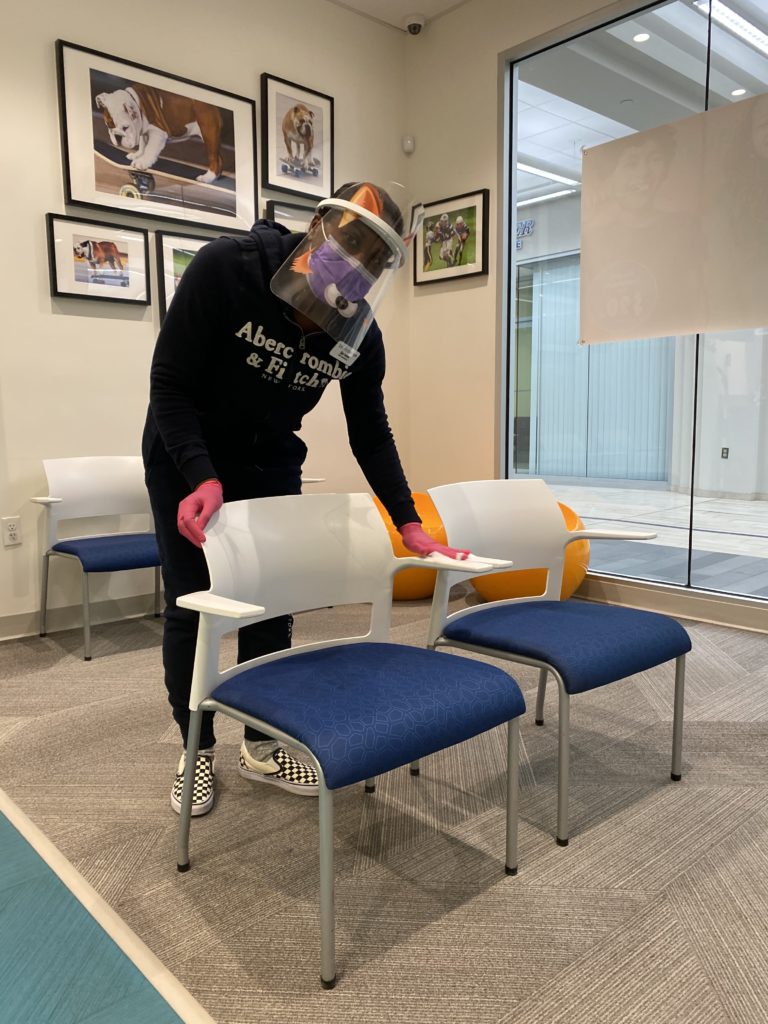Our Approach
We’re Qualified
We teach kids good oral hygiene minus the “classic” fear of going to the dentist. That means staying healthy starts early so routine checkups are as easy as cartwheels and bike rides. We use age-based honesty and a “tell-show-do” approach to kids dentistry.
Positively Prepared
One parent might need to be close-by during dental visits but sooner or later your child will be saying, “I can go all by myself!” Then you’ll feel free to relax in our guest lounge while we teach your child how to care for their teeth. Next, we’ll share our suggestions with you so each of us understands how to keep your child focused, happy, and healthy.
Very Resourceful
Sky’s the limit when we’re talking to parents about healthy kids. We love sharing health tips and valuable information about oral care, nutrition, local events, sports, after-school programs, performing arts, and more. We’ll always do our best to answer your questions in a simple and informative manner.
Unbearably Fun
Time flies when we’re having fun together! Let’s meet at least twice a year to make sure your child’s oral health stays on target. You bring the kids and we’ll bring the fun!

Frequently Asked Questions
At what age do you stop going to pediatric dentist?
A pediatric dentist typically starts seeing children when their first teeth arrive or by age 1 whichever happens first. The average healthy child will continue to develop adult teeth up until they are 12 or 13 years of age. Many pediatric dentists will suggest their patients remain in their care well into their teenage years, ages 16-18.
Do Pediatric dentists see adults?
Many pediatric dentists will suggest their patients remain in their care well into their teenage years, ages 16-18. Some pediatric dentist may choose to continue treating special needs patients in their practices up to age 21.
Can a 3 year old go to the dentist?
You can take your child to a pediatric dentist at age 3 or even younger! Many experts recommend the first dental visit by age 1 or whenever the first baby tooth arrives. During the first dental visit, your pediatric dentist can give you valuable information about baby bottle tooth decay, teething, sucking habits, or oral hygiene techniques.
Do kids have to go to pediatric dentist?
A family dentist can certainly look after your childs teeth and give recommendations to prevent cavities from happening, but they cannot provide the same specialized care your child would receive with a pediatric dentist. In a similar fashion, you would take your child to visit a pediatrician, we always suggest taking your child to see a pediatric dentist for routine care and treatment.
Do toddlers need dental insurance?
Children should see the dentist by their first birthday but having dental insurance in place even earlier can help reduce future dental costs especially since baby bottle decay is the leading cause of cavities in children under age 3. If you dont have dental insurance through your workplace, youll need to shop around for a plan of your own or find out if your child has dental exams covered under their medical plan. Having dental insurance for your toddler is important.
Does my child need a pediatric dentist?
A child should see a pediatric dentist for routine care and treatment. Kids have unique dental needs and deserve exceptional care. Many kids experience their first dental visit with a family dentist whose primary focus is generally adult care dentistry. Dental care in this setting is often intimidating and scary for kids. This first impression can create anxiety and avoidance of the dentist which can last a lifetime.
Why is pediatric dentistry important?
For a child, establishing a dental home as soon as possible is very important. Pediatric dentistry is the first step towards a lifetime of healthy oral care and routine dental visits. Pediatric dentistry can make your child feel safe, calm and carefree during dental care.
What is the difference between a general dentist and a pediatric dentist?
Pediatric dentists have been educated at premier dental schools and have committed their careers to the treatment of children. Beyond the four years of dental school that it takes to become a general dentist, a pediatric dentist spends an extra two to three years in residency training mastering their skills.
What skills do you need for dentistry?
The skills needed for dentistry include but are not limited to: communication, patience, a detailed and analytical approach, an ability to work long hours sometimes under pressure, excellent manual dexterity and teamwork building skills. Strong and clear communication skills, with the ability to adapt your communication to suit different patients.
What skills do you need to be a pediatric dentist?
A fully trained pediatric dentist should have the following skills: excellent manual dexterity, patience, adaptability, a sense of humor, and compassion. These skills are critical to explaining complex dental topics to young patients and their families as they listen and address their concerns.
What happens at your childs first dentist appointment?
Depending on your childs age, the first visit may include oral hygiene instruction, dietary counseling, anticipatory guidance, and a full exam of the teeth, jaws, bite, gums, and oral tissues to check growth and development. Your child may also have a gentle cleaning which includes polishing teeth and removing any plaque, tartar, and stains.
How often do you take toddler to dentist?
A toddler should be seen by a dentist every six months for routine dental visits. This helps to establish a dental home early and a good cavity prevention regimen.
Should a 5 year old get cavities filled?
A 5-year old should get cavities filled. Quite often cavities in baby teeth can be repaired with fillings to prevent dental infection from causing pain, spreading to neighboring teeth or adult teeth, or requiring the removal of the tooth.
What do pediatric dental hygienist do?
A pediatric dental hygienist provides dental hygiene services to children. Their responsibilities often include cleaning teeth, performing exams, taking x-rays, recording the findings accurately in patients records, and reinforcing good oral hygiene habits.
Do Pediatric dentists do surgery?
While pediatric dentists are trained to perform minor surgeries such as simple baby tooth extractions, orthodontic extractions for braces, or lip and tongue-tie releases, they may refer your child to an outpatient center for sleep dentistry or an oral surgeon for more complex oral surgeries .
Is dental surgery safe for toddlers?
Toddlers with several cavities may require complex dental work that is often not possible to complete in the traditional dental office due to their limited ability to remain still for extended periods of time. If a lot of dental work is planned, the associated pain may require more sedation than is safe to provide in a standard dental office setting. That’s where outpatient surgical centers, or hospital dentistry comes in to play, offering pediatric dentists the ability to treat children in a true surgical environment, with a team of specialists that includes an anesthesiologist to monitor your childs safety throughout their dental treatment.
Is a pediatric dentist more expensive?
Seeking dental care for your child with a pediatric dentist may be more expensive than dental care through a family dentist but, the extra expense may save you money in the long run. The increased cost is for their expertise and specialty training, specialized dental materials and equipment, specialized safety precautions, and a kid-friendly atmosphere.
Dr. Michelle Anderson is a pediatric dentist board certified by the American Board of Pediatric Dentistry.








